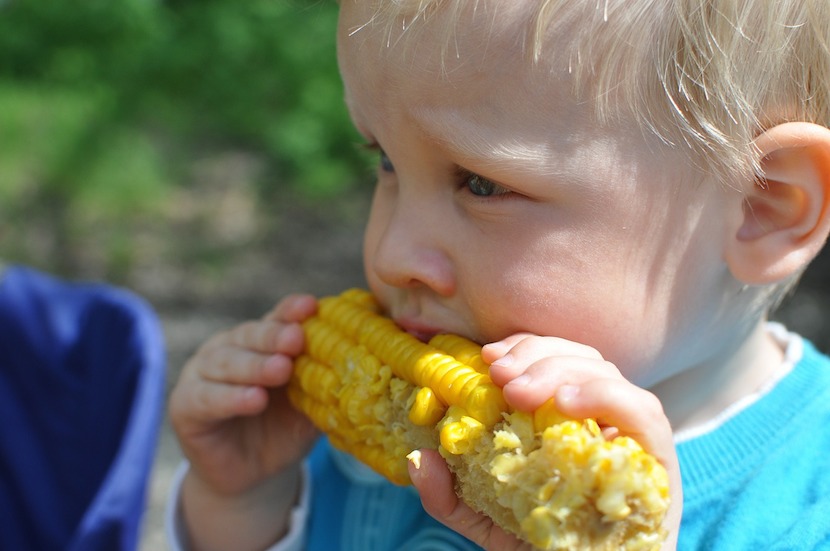
Today we are going to deal with a topic important enough to dedicate this space to it, it is the feeding babies between six and 24 months. As you know, international organizations (WHO, UNICEF) and national (Spanish Association of Pediatrics) recommend exclusive breastfeeding up to six months, and continued with complementary feeding (up to at least two years).
In fact, according to the Spanish Association of Primary Care Pediatrics (AEPAP), this pattern of breastfeeding can be considered the 'gold standard'. Solid foods can be introduced after six months, also taking the baby's needs and preferences as a reference.
At that age, they are better able to accept different flavors and textures, and have also developed the ability to chew and swallow.

What do I feed him? What will you want to eat?
We talk about complementary feeding, because supplements milk intake (ideally maternal). It is advisable to introduce a variety of foods, since all nutrients fulfill specific functions in the body. Nutrients are vitamins, proteins, carbohydrates, fats.
You can give the baby fruits, vegetables, meats, cereals and legumes (remember: gluten no earlier than four months, no later than six). But do not be in a hurry, your child needs to get used to each new flavor, it may be that some do not want to try them again, do not be overwhelmed, the most important thing is the nutritional balance.
Surely your baby will want to eat the same foods as you, or his siblings, you can allow it. Yes indeed: with adjusted amounts, and crushed or crushed, so that no large pieces remain (Be careful with hard foods), thus avoiding the danger of choking. Purees are also worth it, but like other meals, it is preferable that you make them at home, and after 12 months, their presence in the diet considerably reduces, so that the child becomes accustomed to varied textures.
Vegetables (vegetables and others such as potatoes, zucchini or charles) that are preferably fresh: you cook them (better steamed) and season with oil and (perhaps) a little salt. Once you've tried several, you can prepare a dish with two or three of them mixed with cooked legumes or meat.
You can grate the fruit, or boil it a little, there are some with which you do not need any of that: banana, orange (it is easy to crumble), etc. Take a good look the reaction after trying each typeThis way you will detect possible allergic reactions.
Meat, fish, and other animal derivatives
To date, the most widespread recommendations indicate that after six months they can be introduced chicken, turkey, lamb, or beef (avoiding the skin in the first two cases). We will wait a little longer to add pork to the baby's diet.
Fish and egg (first the yolk) always cooked. Any fish (white / blue) is easy to eat with your fingers, and babies love that. In the case of eggs, you can grate the yolk, after a few months the white and the entire egg have passed, thus accompanying other dishes.
Parents, baby, meals
It is not a topic to delve into today, but surely you know more than one mom or dad who baby eating 'brings head'. Many times we forget that it is not mandatory that they like everything, that the amount on the plates must be adjusted to what the little one in the house can eat, that each child has a rhythm, that sometimes they also experience with the food.
Relax! If one rule to follow is to provide a balanced diet, another is to accept that the baby does not have to respond to your expectations regarding meals. The two most frequent mistakes made by parents when eating are: press (to finish the plate) and prohibit. Nutrition and pediatric professionals assure that in the first case there is a risk of inhibiting the natural capacity that makes us realize that we are full. On banning ... some studies find links to being overweight.
Shall I tell you a secret? to accustom children from babies to appreciate healthy eating, nothing better than the foods present at home are healthy. Even with babies over a year old, restrict the consumption of saturated fats (ice cream, butter, fat from meat, cheese), and avoid 'trans' (processed and fried products).
Here is a table prepared by the AEPAP about feeding from six to 24 months
Foods to avoid
- Nuts should not be introduced until the age of three to avoid allergic reactions, but be careful! because a child under six years of age can suffocate by choking due to the ingestion of these whole fruits (with more than three years, crushed / ground can be introduced).
- Grapes, olives, or hard vegetables like charles (unless cooked / grated) can also cause choking.
- Vegetables are healthy, but it is recommended that the baby has reached one year to give chard or spinach.
- The same happens with cow's milk and its derivatives (yogurt, cream, cheeses, butter).
- Little salt and little sugar when preparing food, what's more: if you can, avoid them before 12 months. It is convenient, on the one hand, to avoid the risks of an inadequate intake, and on the other, to appreciate natural flavors.
- To drink water: in front of juices or infusions, sugary / carbonated drinks.
We hope that these guidelines serve as a reference, I would also like to add that the atmosphere at mealtime also counts. Patience on the part of adults, respect for the baby, and also avoid distractions! putting them in front of cartoons at mealtime is not a good idea.

